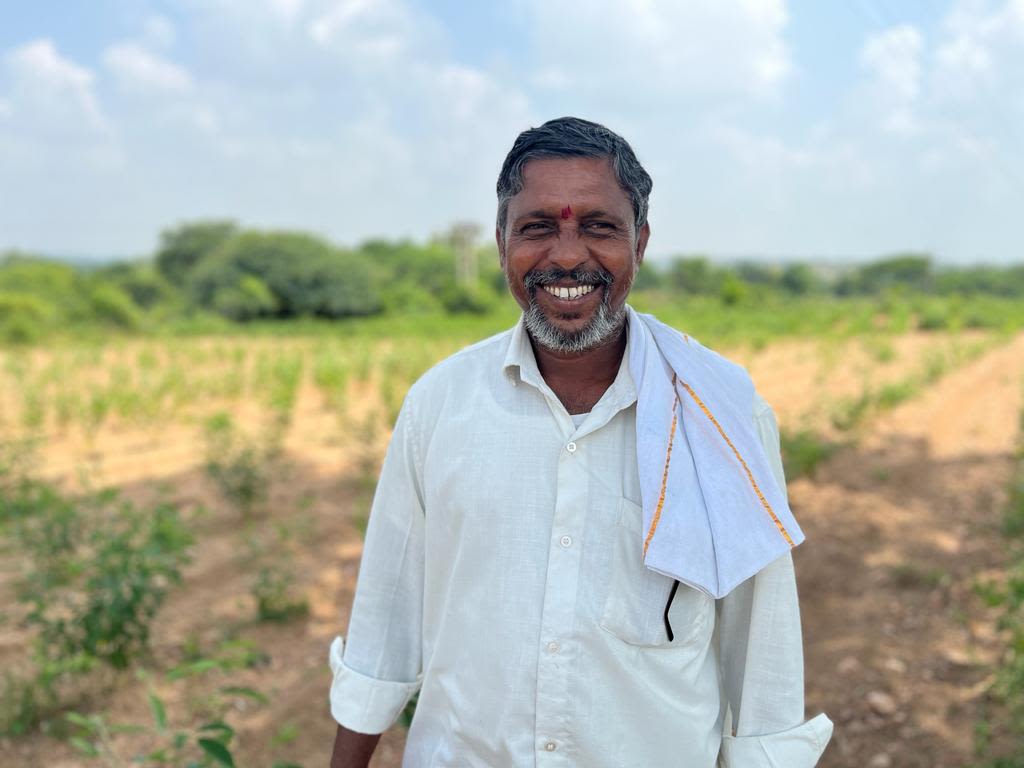A Happier Harvest

52-year-old Bingi Ramulu, a farmer from Ammireddipally village in Narayanpet had given up on his eleven-acre, rainfed plot of land ever yielding him a profit.
“Losses! Only losses!,” Ramulu exclaimed, as he detailed the difficulty of generating a viable income from agriculture. “A few years ago, the entire cotton crop got infested. We get little rainfall here, but that has also become erratic now. Kheti mein paisa zyaada lagta, aur fayda kam aata (Agriculture requires more money, but yields less profit),” he says.
Desperate for a higher yield, Ramulu started pumping high doses of chemical fertilisers and pesticides on crops. “I was spending nearly 2 lakh every season on fertilisers alone,” he says.

Excessive use of chemical fertilisers degraded soil quality and destroyed yeild in Bingi's farm
Excessive use of chemical fertilisers degraded soil quality and destroyed yeild in Bingi's farm
This only aggravated the situation. His spend on fertilisers not only ate away at his razor thin profit margin, but their excessive use also started impacting soil fertility and health. “The colour of soil had started changing. I got a soil test done and it was found to be more acidic. A pH of 7 is good, my soil’s pH was 8.5! Earlier it was red, but in parts I could see it was becoming white,” he recalls.
Pest attacks, too, became more frequent. “Line se crop mar jaata tha (The crop would die in a line). Not knowing what to do, I would go to the fertiliser shop, purchase what was prescribed by the shopkeeper and apply it. What else could I do?,” he asks.
Distressed, and desperate for solutions, Ramulu decided to become a member of one of the 15 Farmer Field Schools (FFSs) in Ammireddipally being run by WOTR, as part of the Axis Bank Foundation’s Sustainable Livelihoods Programme.

The Farmer Field School (FFS) not only enabled Ramulu to discuss issues related to his crops with other farmers, but also find solutions with them through discussions, experimentation, and training sessions with experts. He attended sessions where he learnt about using waste decomposers (a consortium of microorganisms developed from cow dung), and Amritpani (a natural formulation containing a wide range of nutrients making it an elixir for dead soil). Both formulations, which require low input costs, can be easily prepared by farmers and are effective biofertilizers that improve soil health and manage pests.

Bingi learned about waste decomposers and Amritpani at FFS sessions
Bingi learned about waste decomposers and Amritpani at FFS sessions
He also learnt about the System of Rice Intensification (SRI), an agro-ecological methodology for increasing the productivity of irrigated rice by managing plants, soil, water and nutrients. In 2020, he tested what he had learnt in FFS on 10 guntas of his paddy field. “In the 10 guntas, I reduced application of chemicals to 50 percent, used organic formulations, and followed the SRI method,” he says.
The post-harvest results shocked him. “The SRI plot’s yield was five times that of the conventional plot. Not just that, my input cost, from the cost of seeds to fertilisers, reduced considerably,” he says.

Bingi learned about the System of Rice Intensification (SRI), an agro-ecological methodology at the Farmer Field School
Bingi learned about the System of Rice Intensification (SRI), an agro-ecological methodology at the Farmer Field School
A study undertaken to assess the impact of SRI in terms of water savings, input costs, plant growth, and social impacts in the 20 project villages (of which Ammireddypalli was one) found that reduced cultivation costs for seed and labour resulted in a maximum net return of 69 percent over conventional paddy for farmers, and a 22 percent increase in grain yield. The SRI method also required a lower labour deployment reducing costs even further. The net effect is a substantial reduction in the investment on external inputs.
“Socha nahi aisa hoga (I didn’t think this would happen). In these parts, we all grow crops a certain way. Using lots of water, seed and pesticides. I didn’t think that less would do more,” he says. Since he has switched to the use of organic formulations, he says, the pest attacks too have become less severe.
Thrilled by the success, Ramulu adopted System of Crop Intensification (SCI) - a method of agriculture that adapts SRI ideas and methods for rice to the production of other crops - to grow red gram in 2021. Since 2020, he has also drastically reduced application of chemical fertilisers in his field, with 80 percent of his production being 100 percent organic.

“I am scaling down (chemical use) year by year. I rely more on farm manure, neem cakes, and other organic formulations for my field now,” he says.

Bingi sparying organic fertilisers in his red gram farm
Bingi sparying organic fertilisers in his red gram farm
His knowledge and agricultural philosophy has made Ramulu an inspiration in his village.The visible difference between his field and his neighbour’s field has inspired other farmers to experiment with SRI. “I am the un-official agriculture advisor of my village now,” he beams.
Once a distressed farmer, Ramulu is now the role model his neighbours want to emulate.
To invest with WOTR for its initiatives to mobilise communities and revive natural ecosystems, write to Madhavi Kadrekar at info@wotr.org.


